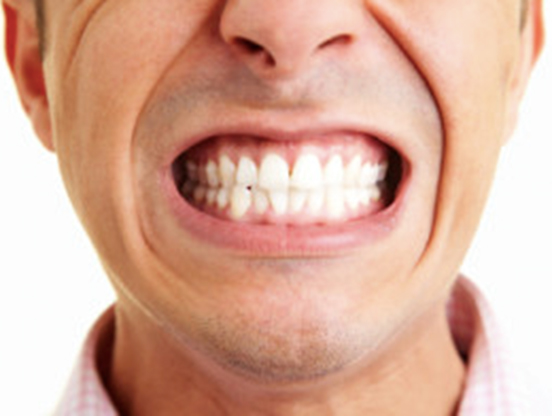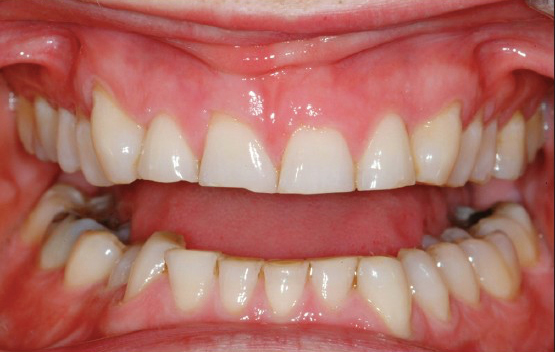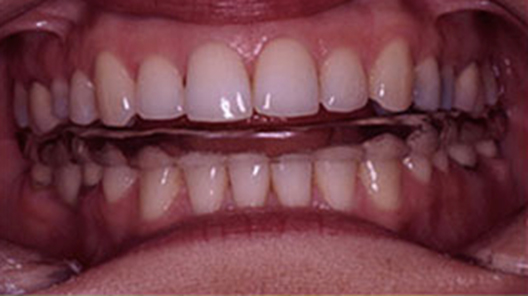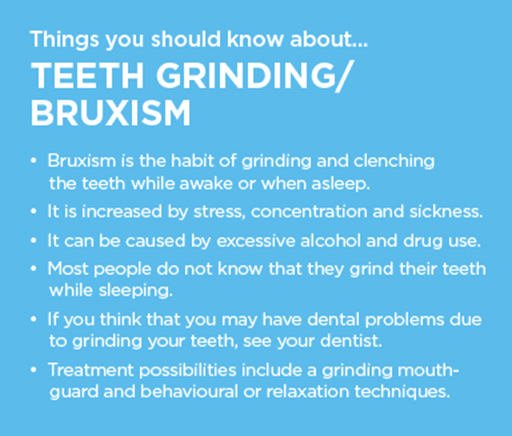Bruxism – what on earth is that?

Bruxism is also known as grinding and/or clenching of your teeth. It is a very common condition that affects both children and adults.
Who has bruxism
It is thought that about half of the population grinds their teeth from time to time. But it may be serious in only about 1 in 20 cases. About 30% of children grind or clench their teeth. Most children grow out of this and suffer no lasting effects to their adult teeth.
What causes bruxism
Some experts consider bruxism to be a habit, while others attribute it to one of the following:
- Stress, anxiety, frustration and anger
- A malocclusion, or when the teeth and jaw do not line up correctly
- A symptom of certain rare diseases of the nerves and muscles in the face
- In rare cases, it may be a side effect of some medicines that treat depression.
- A complication of Huntington or Parkinson’s disease
How do I know if I have it
You may not know that you grind your teeth while you are asleep. A bed partner may be the first person to notice grinding sounds and noises. Other clues may be morning symptoms of a dull headache, jaw muscles that hurt or are tight, trouble opening the mouth wide, long lasting pain in the face, damage to the teeth and broken dental fillings.
Your dentist can help to work out if you have bruxism. You will be asked a series of questions and your overall dental health will be checked. This may include looking for any wear and damage to your teeth, checking the muscles in and around your jaw and the function of the jaw joints, which are just in front of your ears. They may need to look at changes to your teeth and mouth over a number of visits to work out whether the cause is bruxism.
To be sure that you suffer from sleep bruxism, a sleep study may be needed. This will show how much you move your jaw while asleep. A sleep study looking for bruxism by itself is not common, but it may uncover other sleep problems.Bruxism is sometimes associated with snoring, sleep apnoea, or other night-time movement disorders.

Bruxism and Oral Health
The primary causes of bruxism are stress and anxiety. Over time, the physical reaction to emotional stressors of grinding the teeth and clenching the jaw becomes habitual. According to the ADA, people who grind their teeth ultimately weaken their tooth’s structures. Tooth enamel is the protective barrier that surrounds teeth and it is especially prone to damage from teeth grinding. Extra force placed on the teeth from bruxism can also damage restorative dental work, such as fillings and crowns.
Grinding the teeth and clenching the jaw also strain the temporomandibular joint (TMJ), which connects the jawbone to the skull. Long-term strain and stress on the TMJ can produce discomfort, including facial pain and headaches.
How is bruxism treated?
There are many treatments available for bruxism, including relaxation and awareness techniques. Counselling may help to relieve stress in your life. Improving the quality of your sleep can be of benefit. This may include reducing the use of stimulants such as caffeine and nicotine, having enough sleep, making sure you have a good bedtime routine and relaxing before bed. Treating sleep apnoea in some people may also help to control sleep bruxism.
There are no medications that will stop sleep bruxism. A grinding mouthguard can be made. This is like a sports mouthguard, but harder. It will help protect the teeth, muscles and jaw joint from the pressure of clenching and grinding. It will not stop bruxism and in some cases can make the actual grinding worse, but it will lessen the damage to your teeth.
In general, medications aren’t very effective for treatment of bruxism, and more research is needed to determine their effectiveness. Examples of medications that may be used for bruxism include:
- Muscle relaxants. In some cases, your doctor may suggest taking a muscle relaxant before bedtime, for a short period of time.
- Botox injections. Injections of Botox, a form of botulinum toxin, may help some people with severe bruxism who don’t respond to other treatments.
- Medication for anxiety or stress. Your doctor may recommend short-term use of antidepressants or anti-anxiety medications to help you deal with stress or other emotional issues that may be causing your bruxism.
- Meditation can help reduce bruxism

Night Guard for Teeth Grinding
Fortunately, the simplest solution for preventing damage to teethfrom bruxism is the use of a professionally made night guard or splint. Tell your dentist if you or a family member is known to grind their teeth or clench the jaw. Even if you are unaware of the habit, your dentist may notice it during your oral exam because excessive wear on the back molars and enamel loss both indicate bruxism.
A splint for teeth grinding is a custom-fitted oral appliance that is made of plastic. This type of guard is worn during sleep and prevents the teeth from scraping against each other. By addressing bruxism early with professional treatment, you can prevent widespread damage to your teeth.
In addition to prescribing a splint, your dentist may have to restore damaged teeth with crowns or fillings to improve oral function and maintain the proper shape and size of the teeth.

At Dentistry on King, Buderim, we can assess your toothwear and need for a splint or other therapies.
Call us today on 5445 3110 or click here for an appointment.
Article Courtesy Of Health QLD see full article and more here @ healthier.qld.gov.au







